Juvenal, Satire 11
translation and commentary by Lee Tyler (’21) and Charity Yeyeodu (’20)
Translation
lines 56-99:
You will learn today, whether I don’t do things most beautiful to say in life and habits and business; if I praise beans, but secretly I am a glutton; if I openly order porridges from others but I tell the boy in his ear to bring cakes. [60] For when you have promised to be my table companion, you will have Evander as host; you will come as Hercules or a lesser guest than him (and still he touches the heavens by blood), both having been sent to the stars, one by water, the other by flame.
Now listen to what dishes I’ll serve, unequipped by the market: [65] the fattest young goat will come from my Tibertine farm, more tender than the rest of the herd, ignorant of grass and not bold enough to nibble low-hanging twigs of the willow; a goat who is more milk than blood. And mountain asparagus having been picked, once the overseer’s wife put down her spinning. [70] Moreover, large eggs, warming in twisted hay, are present together with their mothers. And grapes, the sort which had been preserved for part of the year on the vines. And Syrian and Signinum pears, and apples of fresh odor, rivaling those from Picenum, from the same baskets. [75] And these are not to be feared by you, since they’ve put down their autumn taste and the dangers of raw juice by means of cold.
At one time, this was a luxurious dinner of our senate. Curius used to place on a modest hearth small greens, which he himself had collected from his little garden, [80] which now even a dirty ditch-digger in large shackles hates, who remembers how the womb of a hot cook-shop tastes. It was the custom, once, to save thin backs of a dried pig hanging with wicker-basket for festival days, and for family to give birthday bacon, [85] with fresh meat adding if it was provided by an animal sacrifice.
Some family member who attained the title of consul three times, who attained commands of camps and the honor of dictator, he used to return earlier than normal to these feasts with his spade on his shoulder from a conquered mountain. [90] When people used to tremble, however, at the Fabii and hard Cato and Scauri and Fabricius, when even a colleague was fearful of the severe morals of the rigid censor, no one, between troubles and serious things, considered it worth considering what kind of tortoise was swimming in a wave of Ocean for the purpose of making [95] a famous and noble arm-rest for Trojan-born princes. But their couches were small with bare sides and bronze front, which were showing a common head of a garlanded donkey, on which playful children of the country would play. Thus, the house and furniture of such sort matched the sort of food.
. . .
lines 120-135:
But now there is no pleasure of eating for rich men–the flatfish and the fallow-deer meat tastes like nothing; perfumes and even roses seem to stink, unless served on a fancy, wide, round table, held up by a rampant leopard made of ivory, with large, open maw, from those teeth which the gateway of Syene sends and [125] fast Moors (send), or India, who is darker than a Moor, and which in Nabataean forest a beast put down, already too heavy for its head. From this, appetite rises, and so does strength to the stomach. For the silver pedestal to these, is like the ring on a finger that is common iron. Therefore [130] I beware the proud guest, who compares me to himself and looks down at insignificant things. Indeed I do not own one ounce of ivory, nor dice or game-piece from this material, nay rather the handles themselves of my small knives are made of bones. However, these knives have never made food rancid nor, therefore, cut a chicken worse for that reason.
. . .
lines 142-148:
My slave boy does not know how to steal a piece of deer nor a flank of African bird, my little recruit, unpracticed all his time and initiated only in the thefts of small morsels. [145] The uncultivated boy will offer plebeian cups bought with a few small coins and he is safe from cold (wrapped up in cloth). He is not Phrygian or Lycian [not anyone that will be sought from a dealer and bought with great cost]: when you give him a command, demand in Latin.
. . .
lines 171-182:
My humble home does not take in these jokes. That guy may hear the clattering of pieces of fired clay with spoken words that even the slave standing naked in stinking brothel abstains from. That guy enjoys obscene voices and every type of lust, [175] who spits wine on the Lacedaemonian marble floors; for indeed there, we give pardon to fortune/high station. For the mediocre, the die (gambling) and adultery is ugly. When those rich people do these same things, they are called cheerful and shining. Today my dinner will give other games: [180] the founder of the Iliad1 and the songs of lofty-sounding Maro 2 will be sung, making dubious palm3. Does it matter whose voice reads such lines?
Commentary
(60-63) Evander was an Italian king who settled on the Palatine hill, which was the future site of Rome. In Aeneid Book VIII, he hosts Aeneas to a feast and recounts Hercules’ heroic visit and subsequent veneration there (Duff, 1962). Hercules is a son of Jupiter, Roman hero, and god, famous for his twelve labors. The “lesser guest” refers to Aeneas himself, the Trojan-born hero considered to be the founder of the Roman race, son of Venus and Anchises. Aeneas could be considered the “lesser guest” for a few reasons. First, Aeneas is the son of Venus while Hercules is the son of Zeus, and Zeus was considered to be the most powerful god. Aeneas could also be considered the lesser guest by the house of Evander because they worship Hercules.
The phrase “one by water, the other by flame” refers to the death of these two heroes. Aeneas died by drowning in the river Numicius and Hercules threw himself on a funeral pyre after putting on a poisonous shirt (Hardy, 1963).
(64-68) Tibertine: Juvenal had a farm/estate at Tibur, which is located about 30 kilometers north-east of Rome and is modern day Tivoli. Literary men traditionally had farms in this area known as Campagna, a low-lying area surrounding Rome in the Lazio region of central Italy. This poem lays much stress on direct links with the country, in the tradition of old Rome, and rejection of the city
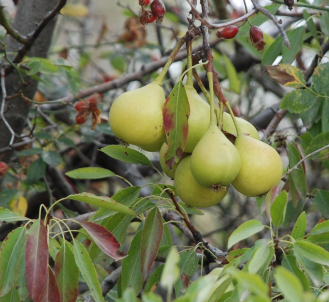
Syrian pears
(73-74) Syrian and Signinum pears: Syrian pears are native to Turkey, Iraq, Syria, Lebanon and Palestine. They were considered by the Romans to be the best pears. Dalby explains that Syrian and Signinum were catchwords that were used to impress guests (Dalby, 2000, p. 253).
Picenum was a coastal region in Italy famous for both its apples and olives (Duff, 1962). Martial mentions olives from this region in his invitation poems (Courtney, 2013) and Horace mentions apples from Picenum in his Satirae II, 4, 70 “Piscenis cedant pomis Tiburtia suco” (Hardy).
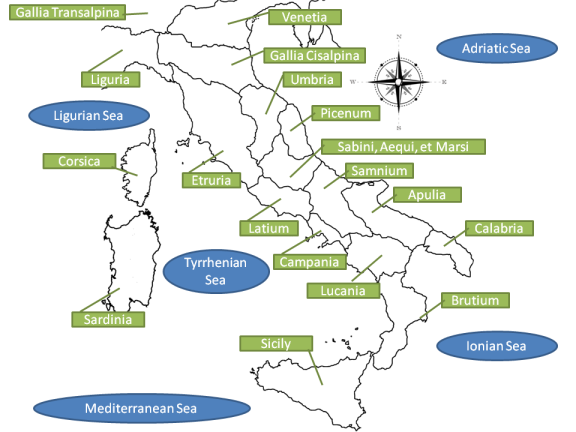
Regions of ancient Italy
(78) Curius: M. Curius Dentatus was censor in 272 B.C. and was famous for his part in the wars against the Samnites and Pyrrhus. Curius was a model of old-fashioned moderation and restraint. Juvenal is alluding to the story of the envoys of the Samnites finding Curius cooking vegetables (Courtney, 2013).
(81) hot cook-shop: Popinae, ‘cookshops,’ were at the heart of lower class culture in Roman society. These establishments were probably the main source from which non-elite could obtain meat. They were primarily the gathering place of the lower class; Juvenal described a popina in Ostia as filled with gangsters, thieves, eunuch priests, etc. (Hartnett, 2017).

View of a ‘fast-food bar’ (popina or thermopolium) at Pompeii
(86) consul: A consul held the highest elected political office of the Roman Republic (509 to 27 BC) and was the highest ranking position in the cursus honorum. Two consuls were elected each year to serve together for a one-year term. After the end of the Republic and the beginning of the Empire (27 BC), the consuls became symbolic representatives of Rome’s republican past. Because of the link to the past, it is significant that the word consul occurs here in the poem. Also, becoming a consul, commander, and dictator are some of the highest ranking positions one could have in Roman society and this high ranking, imagined ancestor still enjoyed simple foods and furniture.
(90-91) Fabii, Cato, Scaurii, Fabricius: All of these names refer to distinguished censors (Hardy, 1963). Here is more information on the Fabii.
(92) censor: “Censor, plural Censors, or Censores, in ancient Rome, a magistrate whose original functions of registering citizens and their property were greatly expanded to include supervision of senatorial rolls and moral conduct.” (Britannica)
(93-95) Trojan-born princes: Not even eastern royalty cared so much about how extravagant their furniture was as the Roman society the Juvenal describes in this satire.
(96) couches: Romans dined on couches that were typically arranged in a triclinium, or three couches. Couches were a staple of upper-class dining in ancient Rome.
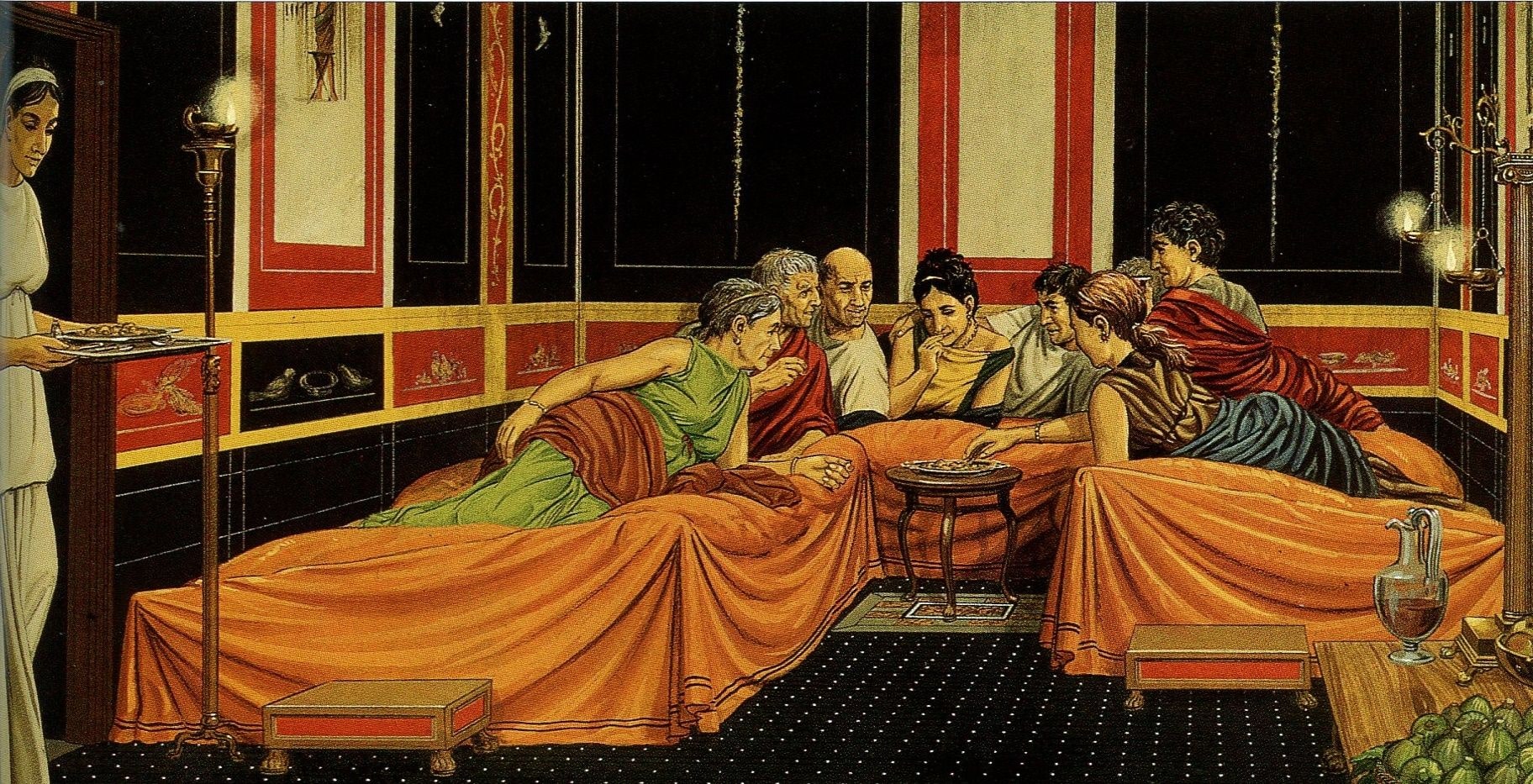
Reconstruction of a dinner party at the house of Lucius Ceius Secundus in Pompeii
The couch and footstool pictured below are from the imperial villa of Lucius Verus (co-emperor, A.D. 161–169), on the Via Cassia outside Rome, reassembled from fragments. “On the couch legs are friezes of huntsmen, horses, and hounds flanking Ganymede. On the footstool are scenes of winged cupids and leopards; and on the sides of the bed frame, the striking lion protomes have eyes inlaid with glass” (Metropolitan Museum)
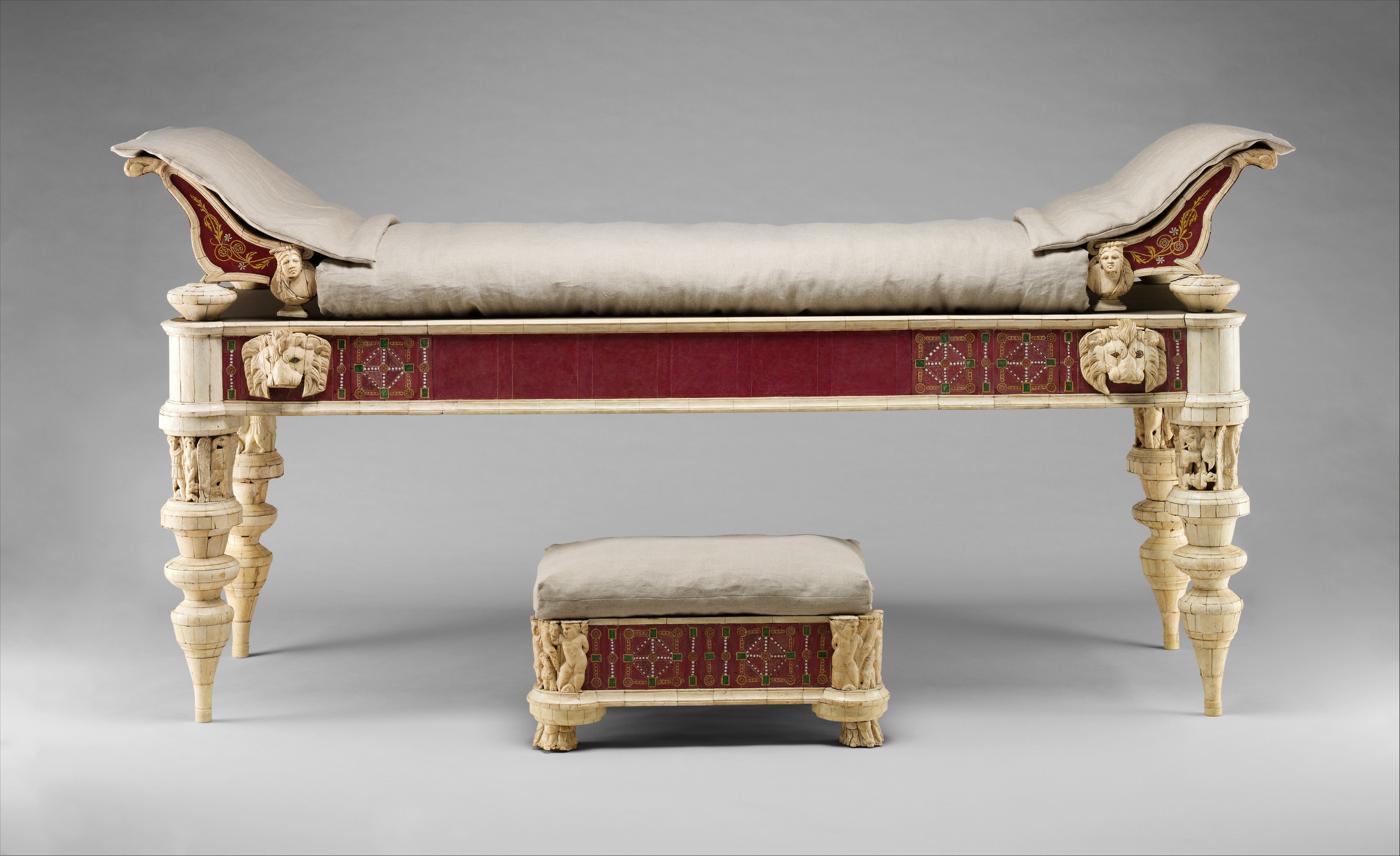
Couch and footstool with bone carvings and glass inlays, 1st–2nd century A.D. Metropolitan Museum of Art 17.190.2076
(123) rampant leopard: The drawing below, an original sketch by Lee Tyler, is an artist’s conception of the “round table, held up by a rampant leopard made of ivory, with large, open maw,” described in these lines with the leopard in the specified position holding up the table top. The base of the table is very ornate and made from valuable material, emphasizing the importance placed on the lavish setting for obtaining enjoyment from a meal.

Drawing of table described in lines 123-124, by Lee Tyler
(124-126) The town of Syene, modern Aswan on the Nile River, was on the frontier of the Roman Empire, serving as the “gate” to the rest of Africa, and the Moors are associated with North Africa, specifically the Morocco area (Hardy 1963, 262-263). The Nabataeans were native to Arabia (Duff 1962, 372). Juvenal invokes the homelands of the Moors and Nabataeans as potential sources of ivory, but elephants (“beasts”) are not native to either place. Additionally, elephants do not put down their tusks when they get too heavy for their heads. Juvenal’s apparent ignorance about the production and sources of ivory reflects a kind of apathy about the origins of the valuable things that the elite Romans are able to obtain. No one cares enough to get the facts straight about ivory, like no one cared to think about the turtles that were eventually turned into arm-rests (94).
(131-134) knives made of bones: the handles were made of bones rather than ivory. Bone is still a luxurious material, however it is not as costly as ivory. Juvenal is writing a satire, so it’s as if he is saying, “I have nothing in my house made of gold, it’s just silver.” Below is an image of the bone-handle of a knife with a lion’s head carved into the end.
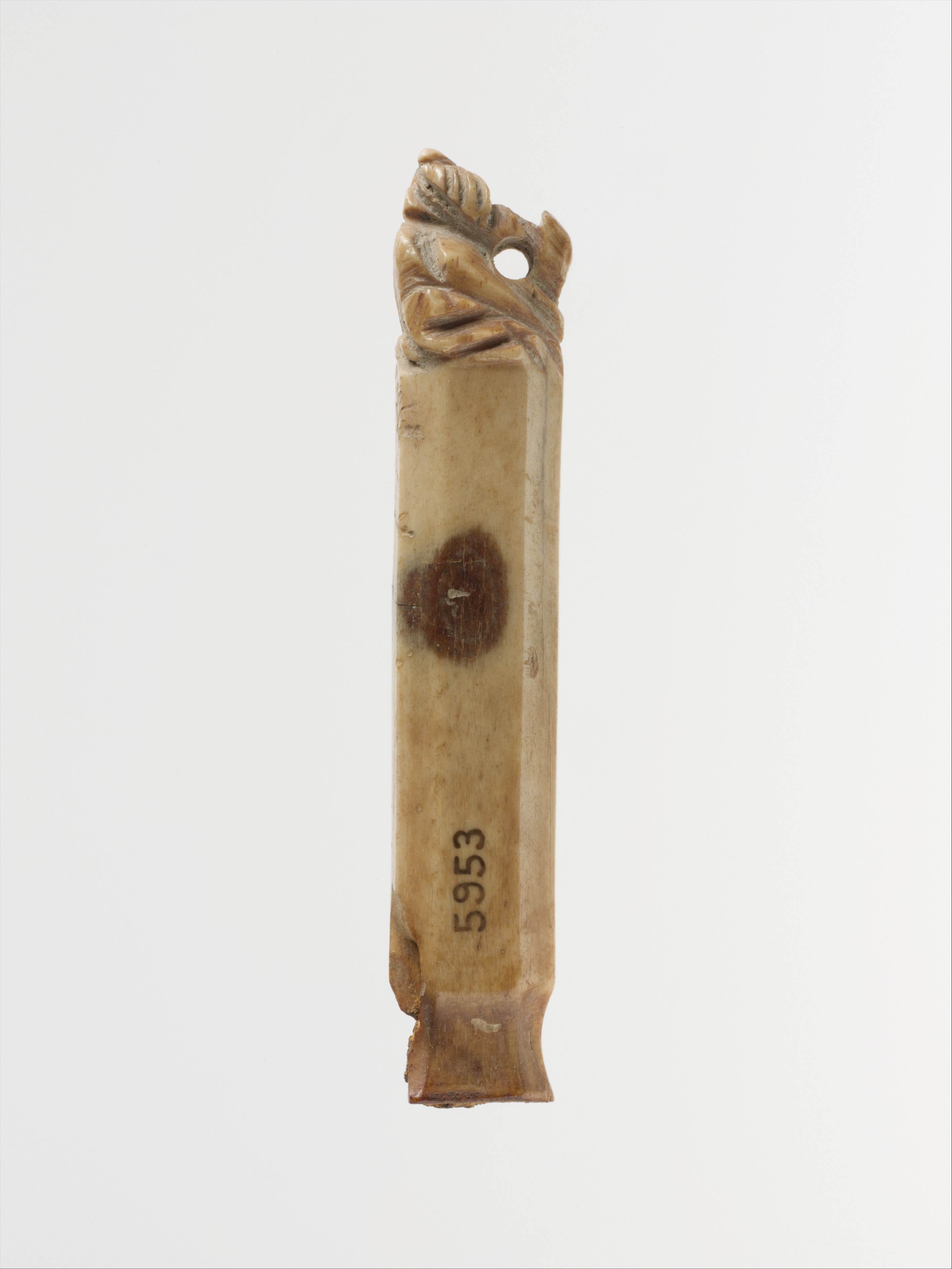
Bone knife handle,1st–2nd century A.D. Metropolitan Museum of Art 74.51.5208
(147) Phrygian or Lycian: Apparently, slaves from these regions (in modern Turkey) were highly sought after and expensive (Wilson 1903, 117).
(172) clattering pieces of fired clay: The reference is probably to makeshift castanets achieved by hitting pieces of broken pottery together to make noise. The image below shows a dancer holding more formal castanets.
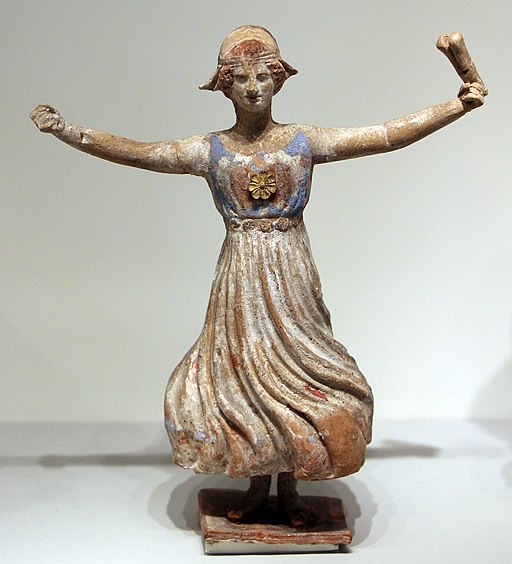
Greek painted terracotta statuette of a dancer holding castanets, 4th-2nd cent. BCE
(175) Lacedaemonian marble floors: Greenish marble stones imported from Laconia (the region of ancient Sparta) would have been very expensive tiles for the floor in a dining room (Hardy 1963, 265).
(180-181) The works of Homer and Vergil would have often been read aloud as the dinner entertainment. Homer was known for the Iliad, which is an ancient Greek epic made up of episodes that describe the Trojan war and the emotional journey of Achilles, and Vergil was known for the Aeneid. In the phrase, “making dubious palm,” palm refers to victory. Describing the songs of Vergil, the phrase suggests that Vergil’s songs will be competing with Homer’s and that it is unclear who will win out in the comparison of the two great poets.
Sources
Courtney, E. 2013. A Commentary on the Satires of Juvenal. Retrieved from https://escholarship.org/uc/item/4jh846pn.
Dalby, A. 2000. Empire of Pleasures. Luxury and Indulgence in the Roman World. New York: Routledge.
Duff, J.D. 1962. Fourteen Satires of Juvenal. Cambridge: Cambridge University Press.
Hardy, E.G. 1963. The Satires of Juvenal. London: Macmillan & Co LTD.
Hartnett, J. 2017. “Bars (taberna, popina, caupona, thermopolium)” Oxford Classical Dictionary.
https://oxfordre.com/classics/view/10.1093/acrefore/9780199381135.001.0001/acrefore-9780199381135-e-8072
Wilson, H.L. 1903. D. IVNI IVVENALIS SATVRARVM. New York: University Publishing Company.